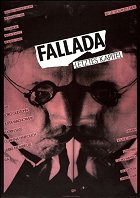Director:
Roland GräfGuión:
Roland GräfCámara:
Roland DresselReparto:
Corinna Harfouch, Jörg Gudzuhn, Katrin Saß, Jutta Wachowiak, Viktor Mikhaylov, Angelika Böttiger, Falk Rockstroh, Aleksey Yakubov, Werner Dissel (más)Sinopsis(1)
In post-1933 Germany, Hans Fallada, who didn't think of himself as a political writer, was one of the few remaining well-known progressive authors. The ever-increasing consolidation of the Nazi's powerbase meant that Fallada was subjected to ever-mounting political pressure, which caused him to descend into a deep personal crisis. As a man with a frail mental constitution, the conflict between his moral convictions and accommodation to the Nazi regime, as well as opportunism, caused him to lose his mental balance. Because it became harder and harder for him to write and publish truly world-class literature, Fallada became trapped in the web of a vicious circle of addictions: namely, to tablets and alcohol - which made him both aggressive and depressed. Anna, his wife, has always been an adviser and enduring pillar for her husband. She has long known about and fought against her spouse's mental breakdowns and insecurity, but now, other than to watch disheartened, she is unable to do anything to counter her husband's increasing binges of self-destruction. Finally, Anna decides to divorce her husband. On top of his violent assaults and insecurity, Fallada has become involved in a number of love affairs: firstly, with the housekeeper Anneliese, and then with a factory owner's widow from Berlin, Ursula Losch - a beautiful and attractive young woman. Fallada is flattered by the affection that Ursula shows him, and even though he discovers that she is a morphine addict he cannot get away from her. After the war, the Russians appointed the poet to the office of mayor, but in this position Fallada proved to be a failure as well. Alcohol and tablets had sapped his strength, and with his last remaining energy, he managed to complete his novel: "Jeder stirbt für sich allein". Totally shattered, Hans Fallada died in February of 1947 of heart failure. (Progress Film-Verleih)
(más)
